2015高考复习必备好资料之 高中中英语语法复习高中英语语法大全【特级教师编写】
- 格式:doc
- 大小:830.50 KB
- 文档页数:59
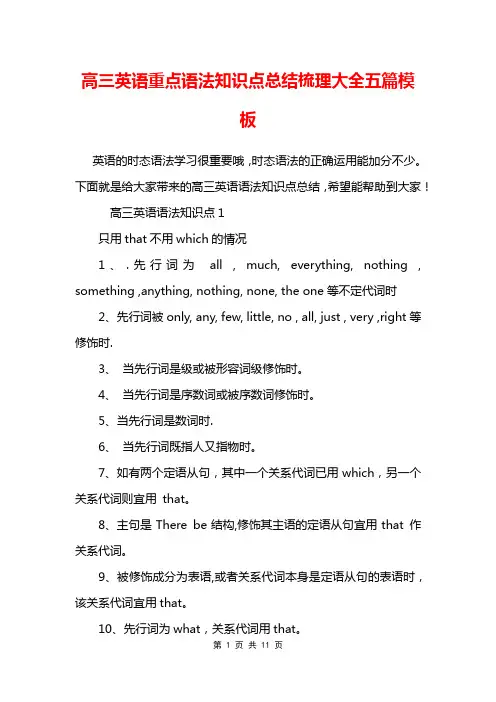
高三英语重点语法知识点总结梳理大全五篇模板英语的时态语法学习很重要哦,时态语法的正确运用能加分不少。
下面就是给大家带来的高三英语语法知识点总结,希望能帮助到大家!高三英语语法知识点1只用that不用which的情况1、.先行词为all , much, everything, nothing , something ,anything, nothing, none, the one等不定代词时2、先行词被only, any, few, little, no , all, just , very ,right等修饰时.3、当先行词是级或被形容词级修饰时。
4、当先行词是序数词或被序数词修饰时。
5、当先行词是数词时.6、当先行词既指人又指物时。
7、如有两个定语从句,其中一个关系代词已用which,另一个关系代词则宜用that。
8、主句是There be结构,修饰其主语的定语从句宜用that 作关系代词。
9、被修饰成分为表语,或者关系代词本身是定语从句的表语时,该关系代词宜用that。
10、先行词为what,关系代词用that。
11、有时为了避免重复而使用that引导定语从句。
只用which不用that的情况1、当介词放在关系代词之前时。
2、在非限制性定语从句中。
3、当关系代词指整个主句的概念时。
只用who不用that的情况1、当先行词是one, ones,anyone或those时。
2、there be 结构中。
3、当先行词是人,后面有较长修饰语时。
4、为了避免重复或引起歧义。
5、当先行词是I,you,he,they等时(常用于谚语中)。
6、先行词是指成员的集体名词。
7、who可以引导非限制性定语从句。
8、先行词是拟人化的名词。
9、先行词指特定的人时用who,不指特定的人用that。
关系副词引导的定语从句1、when时间状语注意:It/Ihis/That + be + the first/ second/ last time that… 只能用that,that可以省略,从句用相应的完成时。
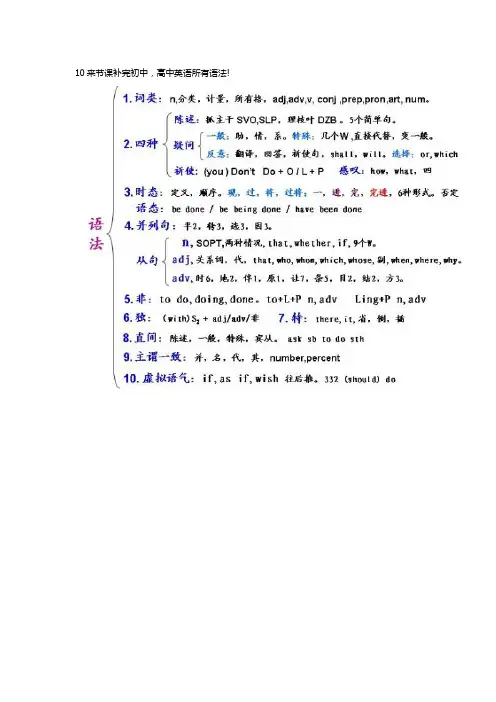
10来节课补完初中,高中英语所有语法!
三张幻灯片就将时态讲得非常全面深刻,把初一到高三的所有时态用一节课讲得清清楚楚,且让学生滚瓜烂熟,运用自如,这是一个非常巨大的创新,之所以能够实现是因为抓住了时态的本质。
时态一共16种,传统教育学一种就要花约5-10节课,学完要花100多节课,且要分为中学六年来学习,这是一个极大的错误,因为口语中每一种时态都可能用到。
而且老师把本来特别
简单的问题弄得很复杂,以至于学生学了还是云里雾里。
我的方法一针见血,直击本质。
不但一节课深刻理解,而且还能灵活运用到口语中。
敢问世界还有谁能做到如此神奇效果。
想了解是怎样实现的。
请看日志《如何让学生在一节课之内学完16种时态》,看了我是如何做到的也就非常相信了。
不但承诺在10来节课补完,补好初中,高中英语所有语法知识,而且讲解细化到了这种程度,实属非常罕见。
一张幻灯片总结清楚冠词的主要用法,熟练掌握冠词只需5分钟不到。
高中生普遍学不好虚拟语气,有的学了几年也没能弄清楚,可是到了我这儿,只需两句话10分钟就讲得清清楚楚!!。
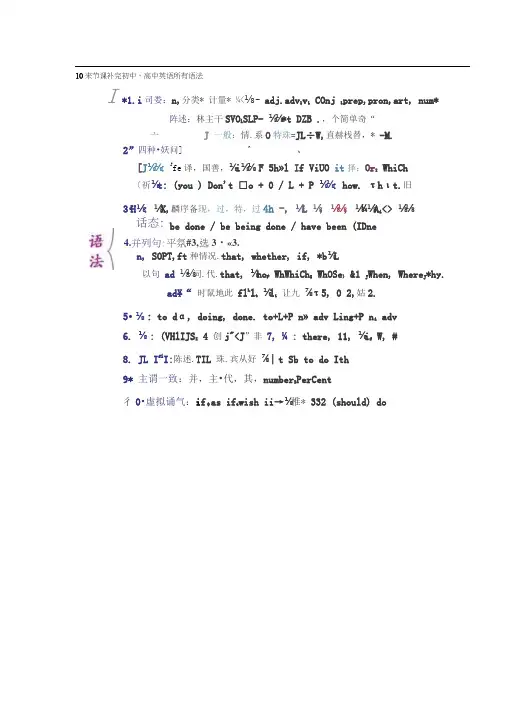
10来节课补完初中,高中英语所有语法I *1.i司娄:n,分类* 计量* ¼<⅛ - adj.adv 1v 1 COnj 1prep,pron,art, num*阵述;林主干SVO l SLP- ⅛⅛*t DZB .,个简单奇“ 亠J 一般:情.系O 特珠=JL÷W,直赫栈替,* -M.2”四种•妖问]^、[J ⅛⅛: J fe 译,国善,⅛i ⅛⅛ F 5h»l I f ViUO it 择;Or I WhiCh〔祈⅛t: (you ) Don't □o + 0 / L + P ⅛⅛: how. τhιt.旧3∙H ⅛: ⅛X,麟序备现,过,特,过4h -, ⅛L ⅛, ⅛⅛, ⅛¼⅛A i <> ⅛⅛be done / be being done / have been (IDnen, SOPT,ft 种情况.that, whether, if, *b ⅛L以句 ad ⅛⅛词.代.that, ⅛ho F WhWhiCh I WhOSe ) &1 J When, Where J *hy.ad¥“ 时鼠地此 fl L l t ⅛l i 让九 ⅞τ5, 0 2,姑2.5∙ ⅛ : to dα, doing, done. to+L+P n» adv Ling+P n i adv 6. ⅛ : (VHlIJS I 4 创j"<J ”非 7, ¼ : there, 11, ⅛i f W, # 8. JL I fl I :陈述.TIL 珠.宾从好 ⅞∣t Sb to do Ith 9* 主谓一致:并,主•代,其,number I PerCent彳0•虚拟诵气:i f φas if t wish ii→⅛椎* 332 (should) do话态: 4.并列句:平氛#3,选3・«3.PrOn —> n作用等效思想基数一卑α , adj num J[序数一单n , adj , adv单Q : S , 0 , P ,同从句∙adjadv非谓语动词IOdO' doingdone--- ►单n , adj , adv ►单n , adj , adv4•化简句子:将一切句子的分析转化为两种简单句的分析.2•推测用法:根据该对象能够等效的词性不同,就可以轻易推测出该对象所能够充当的句子成分.将所有句子的构成规律转化为了两种句子5个简单句.实现了语法前所未有的化简.语法就b个句子,5个句子就是所有语法・狡立主格一►adv词类:n ・、∙dv ∙V ∙ COiIj ∙ PreP ∙PrOIl ∙ art、NI■・(lx:实苗M:仗询)念形客制动连介代甌数专右:人龙.地乂♦B8家老创:TOm I Nan Chong I Chlna中国所有格the Great WaIl it⅛nI可数M規则・不规则 a book , two books—,两本书不可數:汝斛毛紿柚草汁Y two baskets Of apples两蓝子苹果、 a bottle Of Watertwo bottles Of Water两瓶水adj…的级V runΓas t跑得快■4* <adj Very good非常好adv √adv Very fast非常快时间■地点■原囚:yesterday Ihere Why(在)昨天衣那儿为什么PreP PrOn art二、四种句型陈述 疑问:一般,待殊,反意,选择1 •陈述 a ・S+V+O 〜做〜我昨天看了 一部精彩的电影。

【高中英语】高考英语语法复习讲解:英语语法形容词副词及比
较级最高级讲解
【高中英语】高考英语语法复习讲解:英语语法形容词副词及比较级最高级讲解
标题:
高考
英语语法复习与讲解:英语语法形容词、副词和比较最高级
(一)形容词、副词及比较级最高级
一、形容词的修饰和位置
一般来说,从构词法角度来看,后缀”ly”往往是副词,但有的以“ly’结尾的词是形容词而不是副词,这点要注意;形容词一般可以在句子中做定语,表语等成份,但有些形容词在句子中只能做表语和只能做前置定语;这些形容词在修饰时候有一定的特殊性要引起大家的注意,下面做了一下归纳:
1.形容词而非副词以-ly结尾:
costly昂贵的lonely孤独的
死气沉沉
friendly友好的silly傻气的
尽可能地善良热情
leisurely悠闲的ugly长得丑的
兄弟月刊
earthly尘世的
许多以“a”开头的形容词只能用作表达:
afraid害怕的alike相象的
独自醒来
alive活着的ashamed羞愧的
意识到睡着了
well健康的content满意的
无能的无能的
3只作前置定语的形容词
地球是由地球构成的,在地球的日常后者后面 golden金子般的weekly每周的inner里面的丝绸一般月刊外页
wooden木制的yearly每年的elder年长的前羊毛,前羊毛,仅限
only惟一的sheer纯粹的very恰好的。
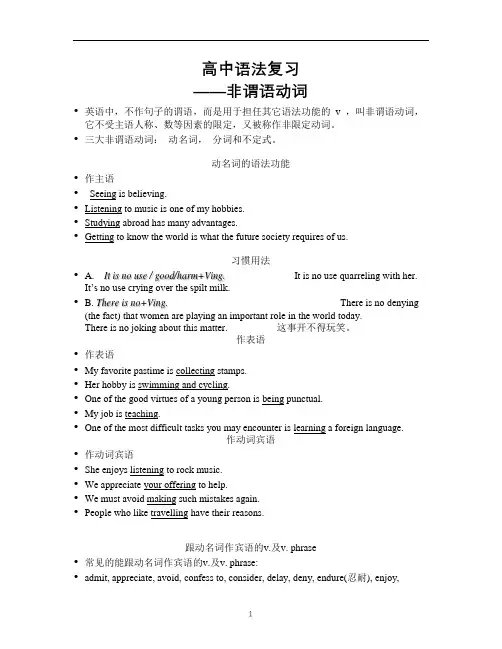
高中语法复习——非谓语动词•英语中,不作句子的谓语,而是用于担任其它语法功能的v ,叫非谓语动词,它不受主语人称、数等因素的限定,又被称作非限定动词。
•三大非谓语动词:动名词,分词和不定式。
动名词的语法功能•作主语•Seeing is believing.•Listening to music is one of my hobbies.•Studying abroad has many advantages.•Getting to know the world is what the future society requires of us.习惯用法• A. It is no use / good/harm+Ving.It is no use quarreling with her.It’s no use crying over the spilt milk.• B. There is no+Ving.There is no denying (the fact) that women are playing an important role in the world today.There is no joking about this matter. 这事开不得玩笑。
作表语•作表语•My favorite pastime is collecting stamps.•Her hobby is swimming and cycling.•One of the good virtues of a young person is being punctual.•My job is teaching.•One of the most difficult tasks you may encounter is learning a foreign language.作动词宾语•作动词宾语•She enjoys listening to rock music.•We appreciate your offering to help.•We must avoid making such mistakes again.•People who like travelling have their reasons.跟动名词作宾语的v.及v. phrase•常见的能跟动名词作宾语的v.及v. phrase:•admit, appreciate, avoid, confess to, consider, delay, deny, endure(忍耐), enjoy,escape, excuse, fancy(想象), finish, forbid, imagine, mind, miss, permit, postpone, practice, risk, can't help, feel like, give up, keep out, object to (反对), oppose, put off(推迟).•注意:动名词作宾语后面带有补语,一般不用形式宾语it。
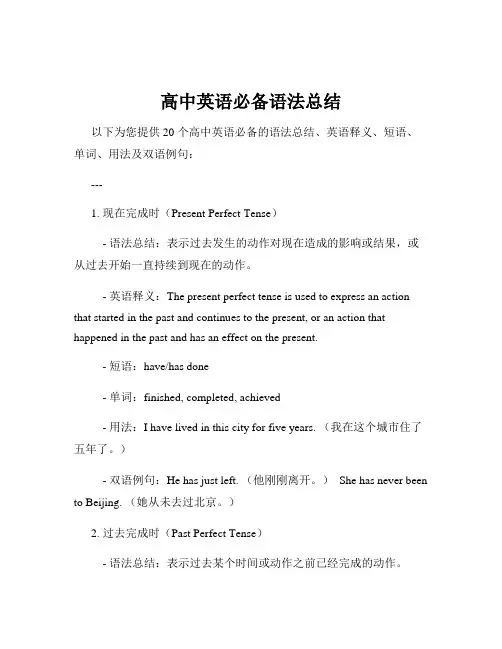
高中英语必备语法总结以下为您提供 20 个高中英语必备的语法总结、英语释义、短语、单词、用法及双语例句:---1. 现在完成时(Present Perfect Tense)- 语法总结:表示过去发生的动作对现在造成的影响或结果,或从过去开始一直持续到现在的动作。
- 英语释义:The present perfect tense is used to express an action that started in the past and continues to the present, or an action that happened in the past and has an effect on the present.- 短语:have/has done- 单词:finished, completed, achieved- 用法:I have lived in this city for five years. (我在这个城市住了五年了。
)- 双语例句:He has just left. (他刚刚离开。
) She has never been to Beijing. (她从未去过北京。
)2. 过去完成时(Past Perfect Tense)- 语法总结:表示过去某个时间或动作之前已经完成的动作。
- 英语释义:The past perfect tense indicates an action that was completed before another past action or time.- 短语:had done- 单词:gone, been, seen- 用法:By the time I arrived, they had already left. (我到的时候,他们已经离开了。
)- 双语例句:She had studied English for five years before she moved to the UK. (在她搬到英国之前,她已经学了五年英语。
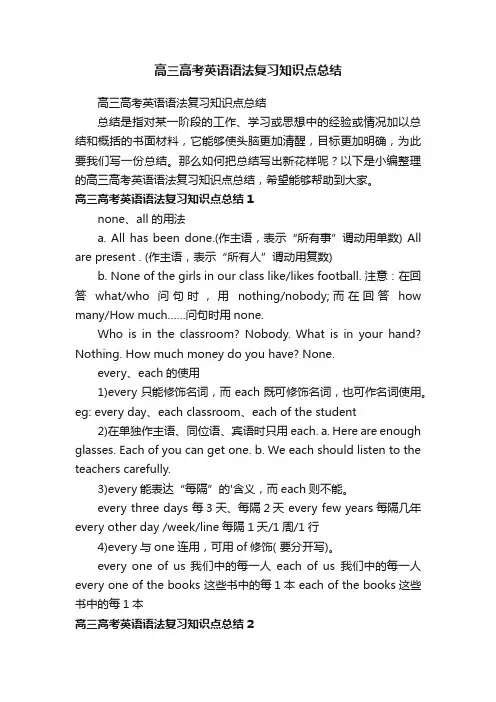
高三高考英语语法复习知识点总结高三高考英语语法复习知识点总结总结是指对某一阶段的工作、学习或思想中的经验或情况加以总结和概括的书面材料,它能够使头脑更加清醒,目标更加明确,为此要我们写一份总结。
那么如何把总结写出新花样呢?以下是小编整理的高三高考英语语法复习知识点总结,希望能够帮助到大家。
高三高考英语语法复习知识点总结1none、all 的用法a. All has been done.(作主语,表示“所有事”谓动用单数) All are present . (作主语,表示“所有人”谓动用复数)b. None of the girls in our class like/likes football. 注意:在回答what/who 问句时,用nothing/nobody;而在回答how many/How much……问句时用none.Who is in the classroom? Nobody. What is in your hand? Nothing. How much money do you have? None.every、each的使用1)every只能修饰名词,而each既可修饰名词,也可作名词使用。
eg: every day、each classroom、each of the student2)在单独作主语、同位语、宾语时只用each. a. Here are enough glasses. Each of you can get one. b. We each should listen to the teachers carefully.3)every能表达“每隔”的'含义,而each则不能。
every three days 每3天、每隔2天 every few years每隔几年every other day /week/line每隔1天/1周/1行4)every与one连用,可用of修饰( 要分开写)。
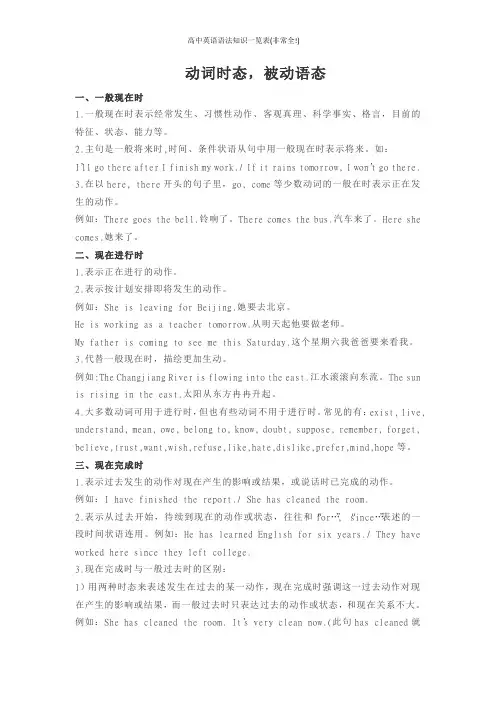
动词时态,被动语态一、一般现在时1.一般现在时表示经常发生、习惯性动作、客观真理、科学事实、格言,目前的特征、状态、能力等。
2.主句是一般将来时,时间、条件状语从句中用一般现在时表示将来。
如:I’ll go there after I finish my work./ If it rains tomorrow, I won’t go there. 3.在以here, there开头的句子里,go, come等少数动词的一般在时表示正在发生的动作。
例如:There goes the bell.铃响了。
There comes the bus.汽车来了。
Here she comes.她来了。
二、现在进行时1.表示正在进行的动作。
2.表示按计划安排即将发生的动作。
例如:She is leaving for Beijing.她要去北京。
He is working as a teacher tomorrow.从明天起他要做老师。
My father is coming to see me this Saturday.这个星期六我爸爸要来看我。
3.代替一般现在时,描绘更加生动。
例如:The Changjiang River is flowing into the east.江水滚滚向东流。
The sun is rising in the east.太阳从东方冉冉升起。
4.大多数动词可用于进行时,但也有些动词不用于进行时。
常见的有:exist, live, understand, mean, owe, belong to, know, doubt, suppose, remember, forget, believe,trust,want,wish,refuse,like,hate,dislike,prefer,mind,hope等。
三、现在完成时1.表示过去发生的动作对现在产生的影响或结果,或说话时已完成的动作。
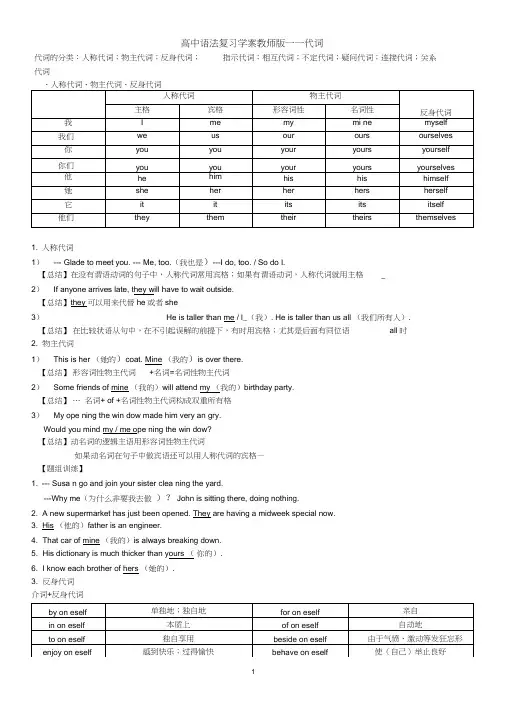
高中语法复习学案教师版一一代词代词的分类:人称代词;物主代词;反身代词;指示代词;相互代词;不定代词;疑问代词;连接代词;关系代词1. 人称代词1)--- Glade to meet you. --- Me, too.(我也是)---I do, too. / So do I.【总结】在没有谓语动词的句子中,人称代词常用宾格;如果有谓语动词,人称代词就用主格_2)If anyone arrives late, they will have to wait outside.【总结】they可以用来代替he或者she3)He is taller than me / l_(我). He is taller than us all (我们所有人).【总结】在比较状语从句中,在不引起误解的前提下,有时用宾格;尤其是后面有同位语all时2. 物主代词1)This is her (她的)coat. Mine (我的)is over there.【总结】形容词性物主代词+名词=名词性物主代词2)Some friends of mine (我的)will attend my (我的)birthday party.【总结】… 名词+ of +名词性物主代词构成双重所有格3)My ope ning the win dow made him very an gry.Would you mind my / me ope ning the win dow?【总结】动名词的逻辑主语用形容词性物主代词如果动名词在句子中做宾语还可以用人称代词的宾格—【题组训练】1. --- Susa n go and join your sister clea ning the yard.---Why me(为什么非要我去做)? John is sitting there, doing nothing.2. A new supermarket has just been opened. They are having a midweek special now.3. His (他的)father is an engineer.4. That car of mine (我的)is always breaking down.5. His dictionary is much thicker than yours (你的).6. I know each brother of hers (她的).3. 反身代词介词+反身代词【题组训练】1. You' II have to see if he has gone to the school for herself.2. The computer may shut off of itself.3. Jim is not bad in himself, but he is a little shy.4. One would rather have a bedroom to on eself.5. I can 'tfinish the work by myself.二、疑问代词1. what & who 的区别1) --- Who is that man ? --- He is her husba nd.2) --- What is the man over there? --- He is a doctor.【总结】what问的是姓名或身份;what问职业或地位2. what & which 的区别1) Which is the biggest ani mal on land, the pan da, the tiger, or the elepha nt?2) What is the biggest ani mal on land?【总结】what是在未知范围内进行选择; which是在已知范围内进行选择【题组训练】1. Which la nguage your friend speak, En glish or Fren ch?2. Could you tell me what your friend speak?3. --- Who is your best frie nd, Hele n? --- Mary.4. --- What is your best friend, Hele n? --- She is a lawyer.3. what的习惯用法the populati on ?What is the dista nee?the price?your address?your attitude?the height / weight / depth / width / size?【句型转换】1. How many people are there in China? What is the population of China?2. How far is it from here to Beijing? What is the distance from here to Beijing?三、不定代词1). Mr. Alcott, headmaster of the school, refused to accept any (任何)of the three suggestions made by theStude nts' Union.2) . There are many trees on either / each side (= both sides) of the street.3) . Neither (者E不)of the two cars is mine. Mine is under repair.4) . All_(所有的)horses are animals, but not all (所有的)animals are horses.5) None (都不) of us could live without other people.【题组训练】1. He had a cut on each foot.2. Every child in the class passed the exam in ati on.3. Each of the houses is slightly different.4. I asked all the childre n and each told a differe nt story.5. Every man is not hon est. = not every ma n is hon est.【题组训练】1) . Would you please make it some other day? (= ano ther day)2) . He will stay here for 3 more days. (= ano ther 3 days)3) Some of the wheat is from Can ada. What about ____ ? A. ano ther B. the other C. others D,the rest4) He will drop in on us ___ day. A. some others B] ano ther C. other D. the rest【题组训练】1) Mr. Zhang gave me a very valuable present, a present ( = one) that I had never seen.2) Mr. Zhang gave me many valuable prese nts, many prese nts ( = ones) that I had n ever see n.3) The book on the desk is better tha n the book ( = that / the one) un der the desk.4) The books on the desk are better tha n the books ( = those / the ones) un der the desk.5) I have a story book, it is an amaz ing one.6) We 'e got a big room, and two small ones.7) If you n eed my bike, you may use it_8) The weight of an elepha nt is much greater tha n that of a horse.9) The words in Un it 6 are more difficult that those / the ones in Un it 5.【题组训练】1) . Many (很多)people don 'have much (很多)food.2) . Many (彳艮多)of the mistakes were just caused by carelessness. 3) . Few (很少)people can live to be 100 years. 4) . You have done very little (彳艮少)for me. 5) . Come in and have a little ( 一点儿)whisky.【题组训练】1) --- How many stude nts are there in the classroom? --- None. 2) --- Who is in the classroom? --- No one.1) I have 2 dogs. One is black and the other is white. 2) Some people came by bus, others came on foot. 3) I don 'li t e this dress, show me some others. 4) Have you got any other questi on? 5) Saying is one thing and doing is another.6) These two apples are rotten, but the others are all good.It 的用法1.基本用法1) It 'sa lovely baby. Is it a boy or a girl? 说话者不清楚或不必要知道说话对象的性别 ____ 2) --- I v e broken a plate. --- It doesn 'matter. 前面提到过的事情3) The Parkers bought a new house but it will n eed a lot of work before they can move in. 未指明但谈话双方都明白的事情2. 特别指代的事物 1) It is half past two now.2) It is 6 miles to the n earest hospital. 3) It is very cold in the room. 4) A lovely day, isn ' it ? 3. 用作形式主语或形式宾语 (指时间)(指距离) (指温度) (指天气)A. 形式主语1) It 'skind of you to help us.6. 与符合不定代词构成的习惯搭配 1) He is nothing but a clerk. 2) He is anything but a clerk.3) He is some one (somebody) / someth ing / not an ybody 4) She is something of a doctor. She has saved may lives.5) He is a scientist or something .他只是一名职员。
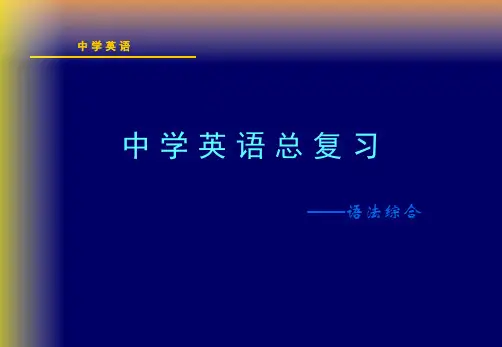
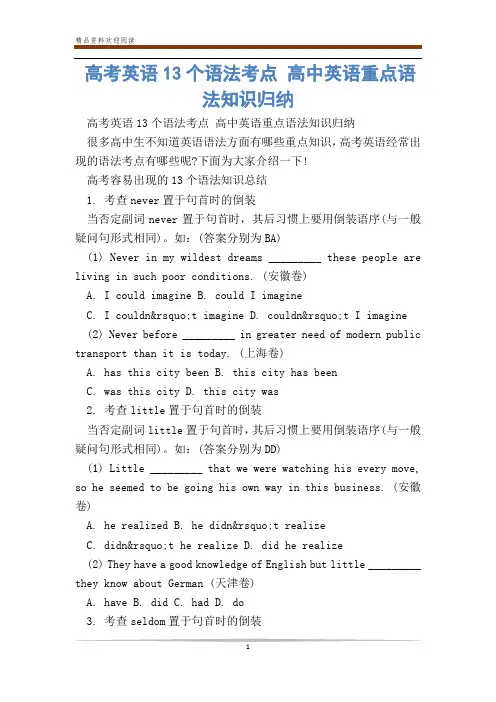
高考英语13个语法考点高中英语重点语法知识归纳高考英语13个语法考点高中英语重点语法知识归纳很多高中生不知道英语语法方面有哪些重点知识,高考英语经常出现的语法考点有哪些呢?下面为大家介绍一下!高考容易出现的13个语法知识总结1. 考查never置于句首时的倒装当否定副词never置于句首时,其后习惯上要用倒装语序(与一般疑问句形式相同)。
如:(答案分别为BA)(1) Never in my wildest dreams _________ these people are living in such poor conditions. (安徽卷)A. I could imagineB. could I imagineC. I couldn’t imagineD. couldn’t I imagine(2) Never before _________ in greater need of modern public transport than it is today. (上海卷)A. has this city beenB. this city has beenC. was this cityD. this city was2. 考查little置于句首时的倒装当否定副词little置于句首时,其后习惯上要用倒装语序(与一般疑问句形式相同)。
如:(答案分别为DD)(1) Little _________ that we were watching his every move, so he seemed to be going his own way in this business. (安徽卷)A. he realizedB. he didn’t realizeC. didn’t he realizeD. did he realize(2) They have a good knowledge of English but little _________ they know about German (天津卷)A. haveB. didC. hadD. do3. 考查seldom置于句首时的倒装当否定副词seldom置于句首时,其后习惯上要用倒装语序(与一般疑问句形式相同)。
高考必考英语语法大全虚拟语气在各种从句的应用主语从句的虚拟1. It is + adj. + that sb. (should) do 常见的形容词有:necessary, important, strange, natural It'simportant that he take my advice.2. It is + n. + that sb. (should) do 常见的名词有:a pity, a shame, no wonder, one's wish It's a pitythat he be so silly.3. It is + done + that sb. (should) do 常见的过去分词有:suggested, advised, demanded,requested, required, asked, ordered, proposed, decided, desired, insisted 等。
It's requested that she go home as soon as possible. 宾语从句的虚拟1. 表命令,表建议,表要求的动词,后接宾语从句虚拟。
虚拟的构成为(should) do 。
I advise that he stay at home.2. wish 后接从句,虚拟的构成是往过去推一个时态。
I wish I had watched the football match last night. 注意以下几组词或短语用于虚拟语气中。
1. as if, as thoughHe speaks English as if he were a native speaker.2. otherwise, but, even thoughHe was ill. Otherwise he would have been there.3. with, without, but forWithout your help, I would have died two years ago.But for your help, I would have died two years ago.4. would rather I'd rather you told me yourself.5. It's time thatIt's time that you went to bed.It's time that you should go to bed.表语从句中的虚拟在表语从句中,表示间接的命令,要求、请求、建议、决定等,主句中的主语通常是suggestion, proposal, request, orders, idea 等。
高考英语基础语法考点整理一、名词1.特殊名词的复数:child-children, man-men, woman-women, foot-feet, tooth-teeth,mouse-mice,sheep-sheep, species-species, stomach-stomachs, deer-deer,goose-geese,ox-oxen, Chinese-Chinese, Japanese-Japanese, phenomenon-phenomena,means-means,series-series, crisis-crises, basis-bases, German-Germans,Australian-Australians2.不可数名词:advice, baggage, equipment, information, luggage, furniture, fun, weather,knowledge, jewelry, progress, traffic3.可数不可数均可,但意思不同arm手臂,arms武器good好处,goods货物green绿色, greens蔬菜paper纸, papers论文sand沙, sands沙滩time时间, times时代water水,waters水域wood木材, woods森林work工作, works著作experience经验, experiences经历room空间, rooms房间exercise锻炼, exercises 练习4.只有复数形式的名词trousers, clothes, socks, shorts, goods, thanks,congratulations, belongings, scissors, glasses, wages工资;riches财富;surroundings环境;ashes灰尘;compasses圆规5.复数形式,单数意思的名词plastics, news, politics, physics, mathematics6.复合名词的复数形式:girl-friends, boy-students, women-teachers, men-workers, passers-by,go-betweens, grown-ups7.谓语动词用复数的名词police,cattle, clothes, goods8.抽象名词具体化为可数名词surprise, cold, pleasure, pity, failure, success, worry, honor, must,difficulty, youth, beauty, wonder, danger, interest9.辅音字母+o结尾复数加-es的名词tomato-tomatoes, potato-potatoes, hero-heroes10.变“f”或“fe”为“v”之后再加-es为复数形式的名词wife-wives, life-lives, knife-knives, wolf-wolves, self-selves,leaf-leaves,shelf-shelves, thief- thieves11.特殊注意的名词people (民族,人)nature (自然,特性)man(男人,人类),youth (年轻人,青年男子,青春)12.特殊注意的搭配congratulations祝贺have words with sb. 同某人吵架in high spirits以很高热情地give one’s regards to sb.向某人问侯in rags衣衫破烂It is good manners to do sth.有礼貌做某事二、动词时态和语态1.常考动词时态(1)三个一般:一般现在时、一般过去式、一般将来时;(2)三个现在:现在进行时、现在完成时、现在完成进行时;(3)三个过去:过去进行时、过去完成时,过去完成进行时。
免费英语网 www.mfyyw.com 精品资料 高中英语语法 学习提纲 张杰 时态
一、词类、句子成分和构词法: 1、词类:英语词类分十种: 名词、形容词、代词、数词、冠词、动词、副词、介词、连词、感叹词。 1、名词(n.): 表示人、事物、地点或抽象概念的名称。如:boy, morning, bag, ball, class, orange. 2、代词(pron.): 主要用来代替名词。如:who, she, you, it . 3、形容词(adj..):表示人或事物的性质或特征。如:good, right, white, orange . 4、数词(num.): 表示数目或事物的顺序。如:one, two, three, first, second, third, fourth. 5、动词(v.): 表示动作或状态。如:am, is,are,have,see . 6、副词(adv.): 修饰动词、形容词或其他副词,说明时间、地点、程度等。如:now, very, here, often, quietly, slowly. 7、冠词(art..):用在名词前,帮助说明名词。如:a, an, the. 8、介词(prep.): 表示它后面的名词或代词与其他句子成分的关系。如in, on, from, above, behind. 9、连词(conj.): 用来连接词、短语或句子。如and, but, before . 10、感叹词(interj..)表示喜、怒、哀、乐等感情。如:oh, well, hi, hello. 2、句子成分:英语句子成分分为七种:主语、谓语、宾语、定语、状语、表语、宾语补足语。 1、主语是句子所要说的人或事物,回答是“谁”或者“什么”。通常用名词或代词担任。如:I‘m Miss Green.(我是格林小姐) 2、谓语动词说明主语的动作或状态,回答“做(什么)”。主要由动词担任。如:Jack cleans the room every day. (杰克每天打扫房间) 3、表语在系动词之后,说明主语的身份或特征,回答是“什么”或者“怎么样”。通常由名词、代词或形容词担任。如:My name is Ping ping .(我的名字叫萍萍) 4、宾语表示及物动词的对象或结果,回答做的是“什么”。通常由名词或代词担任。如:He can spell the word.(他能拼这个词) 有些及物动词带有两个宾语,一个指物,一个指人。指物的叫直接宾语,指人的叫间接宾语。间接宾语一般放在直接宾语的前面。如:He wrote me a letter . (他给我写了一封信) 有时可把介词to或for加在间接宾语前构成短语,放在直接宾语后面,来强调间接宾语。如:He wrote a letter to me . (他给我写了一封信) 5、定语修饰名词或代词,通常由形容词、代词、数词等担任。如: Shanghai is a big city .(上海是个大城市) 6、状语用来修饰动词、形容词、副词,通常由副词担任。如:He works hard .(他工作努力) 7、宾语补足语用来说明宾语怎么样或干什么,通常由形容词或动词充当。如:They usually keep their classroom clean.(他们通常让教室保持清洁) / He often helps me do my lessons.(他常常帮我做功课) / The teacher wanted me to learn French all by myself.(老师要我自学法语) ☆同位语通常紧跟在名词、代词后面,进一步说明它的情况。如:Where is your classmate Tom ?(你的同学汤姆在哪里?) 3、构词法:英语构词法主要有:合成法、派生法和转换法。 1、合成法:如:spaceship, headache, basketball, playground等等。 2、派生法: (1)派生名词:①动词+er/or ②动词+ing ③动词+(t)ion ④形容词+ness ⑤其他,如:inventor, learner, swimming, congratulation, kindness, carelessness, knowledge (2)派生形容词:①名词+y ②名词+ful ③动词+ing/ed ④friendly ⑤dangerous ⑥免费英语网 www.mfyyw.com 精品资料 Chinese; Japanese ⑦English ⑧French ⑨German ⑩国名+(i)an 如:snowy, sunny, hopeful, beautiful, interesting, follwing, daily(每日的),nervous, delicious (3)派生副词:①形容词+ly ②其它,如:slowly, angrily, full→fully, good→well, possible→possibly等等。
3、转换法: (1)形容词→动词,如:dry(干燥的)→dry(弄干), clean(干净的)→clean(打扫,弄干净),等等。 (2)动词→名词,如:look, walk, rest, work, study, swim, go, talk等等。 (3)名词→动词,如:hand(手)→(传递),face(脸)→(面对)等等。 (4)形容词→副词,如:early→early, fast→fast等等。 (5)副词→连词,如:when(什么时候)→(当……时候),等等。 (6)介词→副词,如:in(到……里)→(在里面;在家),on(在…上)→(进行,继续),等等。
二、名词: 1、英语名词可分专有名词和普通名词两大类: 1、专有名词是个别的人、地、物、团体、机构等的专用名称。 专有名词中实词的第一个字母要大写。 如:Beijing, Tom, the People‘s Republic of China(中华人民共和国) 专有名词如果是含有普通名词的短语,则必须使用定冠词the。如:the Great Wall(长城) 姓氏名如果采用复数形式,则表示该姓氏一家人(复数含义),如:the Greens( 格林一家人)。 2、普通名词是许多人或事物的共有名称。如:pupil, family, man, foot. 普通名词又分为可数名词和不可数名词。 ▲可数名词是可以用简单的数词进行计数的名词,如: box, child, orange; ▲不可数名词是不可以用简单的数词进行计数的名词。如:water, news, oil, population, information . 2、英语可数名词的单复数:英语可数名词有单数和复数两种形式。 1、名词由单数变复数的基本方法如下: ①在单数名词词尾加s。如:map → maps,boy→ boys,horse→ horses, table→ tables. ②s,o,x ,sh,ch结尾的词加es.如:class→classes, box→boxes, hero→heroes, dish→dishes, bench→benches. [注]:少数以o结尾的词,变复数时只加s。如:photo→photos, piano→pianos. ③以辅音字母加y结尾的名词,变y为i,再加es。如:family→families, city→cities, party→parties.
④以f或fe结尾的名词,变f或fe为v,再加es。如:shelf→shelves, wolf→wolves, life→lives, knife→knives. 2、不规则变化:man→men, woman→women, sheep→sheep,tooth→teeth, fish→fish, child→children, ox→oxen, goose→geese
不可数名词一般没有复数形式,说明其数量时,要用有关计量名词。如:a bag of rice→two bags of rice, a piece of paper→three pieces of paper, a bottle of milk→five bottles of milk.
3、名词所有格: 1、 名词所有格表示所属关系,相当于物主代词,在句中作定语、宾语或主语。其构成法如下: (1)表示人或其它有生命的东西的名词常在词尾加‟s。如:Childern‘s Day(儿童节), my sister‘s book(我姐姐的书) (2)以s或es结尾的复数名词。只在词尾加‟。如:Teachers‘ Day(教师节) (3)有些表示时间、距离以及世界、国家、城镇等无生命的名词,也可在词尾加‘s. 如: today‘s newspaper(今天的报纸), ten minutes‘ break(十分钟的课间休息), China‘s population(中国的人口). 免费英语网 www.mfyyw.com 精品资料 (4)无论表示有生命还是无生命的东西的名词,一般均可用介词of短语来表示所有关系。如: a fine daughter of the Party(党的好女儿). 2、[注解]: ① ‗s还可以表示某人的家或者某个店铺,如:my aunt‘s(我阿姨家), the doctor‘s(诊所) ② 两人共有某物时,可以采用 A and B‘s 的形式,如:Lucy and Lily‘s bedroom(露西和丽丽合住的卧室) ③ “of+名词所有格/名词性物主代词”,称为双重所有格,如:a friend of my father‘s(我父亲的一位朋友), a friend of mine(我的一位朋友)
4、名词或代词作主语时和谓语之间的单复数的一致问题: 1、谓语和谓语基本保持单复数的一致,即:主语是可数名词单数或不可数名词时,谓语动词用单数形式:如:The computer was a great invention.(计算机是个了不起的发明)The water in the glass is very cold.(玻璃杯里的水很冷) 2、集体名词(如family, class, team, group, row, police, school等)做句子主语时, ① 如果表示整体概念,则谓语用单数形式,如:Class Three is a very good class.(三班是好班) ② 如果表示其中的所有成员时,则谓语用复数形式,如:Class Three have a map of China.(三 班有张中国地图) 3、Chinese, Japanese, fish, sheep, people等表示单个时谓语用单数,表示许多时,谓语用复数。如:There is a sheep in the yard.(院子里有只绵羊) / There are some sheep in the yard.(院子里有一些绵羊) 4、maths, news等虽然有s结尾,但不是复数,因此谓语仍用单数:The news is very exciting. (这个消息令人兴奋) 5、glasses, shoes, socks, trousers, gloves等名词往往用复数形式,故谓语用复数。如: The trousers are very cheap and I want to take them.(裤子很便宜,我想买) 6、a lot of 后跟名词复数时谓语用复数形式,跟不可数名词时谓语用单数形式。如:A lot of students are playing baseball now.(现在有许多学生在打垒球) A lot of time was wasted on that work.(大量的时间花在了那个工作上)(被动句) 7、and 连接两个名词做主语时,谓语原则上用复数,但是两个名词若构成一个整体事物时,谓语则用单数。如:The teacher and his son are picking apples now.(老师和他的儿子在摘苹果) / Fish and chips is very famous food. (鱼和薯条是一种出名的食品) 8、 there be 句型中be的单复数一般由靠近的名词决定。如:There is a table and four chairs in the room.(房间里有一张桌子和四张椅子) 9、用both…and…连接两个事物做主语时,谓语一般用复数。如:Both you and I are required to be here tomorrow.(你和我明天要求都来) 10、主语中含有with的短语时,谓语单复数由with之前的人物决定。如:A woman with a 7-year-old child was standing at the side of the road. (一名妇女带着一个七岁的孩子(当时)就站在路边) 11、either…or…或者 neither…nor…连接两个人物做句子主语时,谓语采用就近原则。如:Either you or he is right.(要么是你对,要么是他对。/你和他有一个人是对的) / Neither you nor I am going there.(你和我都不打算去那里) 12、表示一段时间或长度概念的复数名词做主语时,谓语一般用单数。如:Two months is not a short time.(两个月不是个短时间)Two thousand kilometers is quite a long distance(距离).(两千千米是相当长的一段距离) 13、主语中含有half of… / (three quarters)of… / all (of) the ….等词语时,谓语的单复数由名词确定,如:Over three quarters of the information on the Internet is in English.(因特网上四分之三以上的信息是用英语写的) / A third of the students were playing near the lake.(学生的三分之一(当时)正在湖边玩耍) / All of the water in these rivers has been polluted.(这些河流中的水已经被污染了)(被动句)